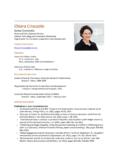Transcription of NATIONAL RISK ASSESSMENT FOR IRELAND - …
1 NATIONAL Risk ASSESSMENT IRELAND Money Laundering and Terrorist Financing NATIONAL RISK ASSESSMENT FOR IRELAND Money Laundering And Terrorist Financing NATIONAL Risk ASSESSMENT IRELAND Money Laundering and Terrorist Financing CONTENTS Executive Summary .. 1 Background.
2 5 Legal, Judicial and Supervisory Framework .. 15 Main Threats .. 24 Financial Services Sector .. 35 Non-Financial Sector .. 51 Legal Entities and Arrangements .. 72 Cash and other Payment Methods .. 79 Terrorist Financing .. 87 NATIONAL Risk ASSESSMENT IRELAND Money Laundering and Terrorist Financing NRA IRELAND | 1 Executive Summary 1 Objective of NATIONAL Risk ASSESSMENT This is IRELAND s first money laundering and terrorist financing (ML/TF) NATIONAL risk ASSESSMENT (NRA), and the aim of this process was to identify, understand and assess the money laundering and terrorist financing risks faced by IRELAND .
3 This NRA is also intended to provide the basis for an Action Plan, which, together with the feedback from the FATF Mutual Evaluation Report (MER) and the transposition of the 4th Anti-Money Laundering Directive (4 AMLD),1 will lay the ground for further strengthening the Irish anti-money laundering and countering the financing of terrorism (AML/CFT)2 regime. The Financial Action Task Force (FATF) is an inter-governmental body whose objectives are to set global standards, to promote and to review the effective implementation of legal, regulatory and operational AML/CFT measures. IRELAND has been a member of the Financial Action Task Force since 1991.
4 In 2012, the FATF revised the international standards by placing at the core of its forty recommendations a new requirement for countries to identify, assess and understand ML/TF risks particular to their jurisdictions. IRELAND is committed to the implementation of the FATF s recommendations which have been endorsed by over 180 countries as the international standards for combating money laundering, countering financing of terrorism, and forestalling the proliferation of weapons of mass destruction. The requirement to assess risks at country-level is central to the FATF s analysis of the effectiveness of AML/CFT infrastructures.
5 Compliance with many of the remaining recommendations is linked to the quality of the NRA, as the general view is that achieving a clear and comprehensive view of NATIONAL risks allows countries policy makers to establish effective multi-agency mechanisms to coordinate domestically on effectively combating identified threats. The European Union has adopted a similar risk-based approach, and the 4th Anti-Money Laundering Directive will impose obligations on Member States, on the Commission, and on the EU s supervisory agencies to contribute to an ongoing analysis of ML/TF risks at business, country, and EU levels.
6 Although this is IRELAND s first NATIONAL ML/TF risk ASSESSMENT , the country s current commitments as a FATF member and its future legal obligations as an EU Member State mean that it will update this ASSESSMENT on an ongoing basis,3 in order to reflect changes to existing threats and vulnerabilities, and new threats and vulnerabilities as they emerge. 1 Directive (EU) 2015/849 of the European Parliament and of the Council of 20 May 2015 on the prevention of the use of the financial system for the purposes of money laundering or terrorist financing, 2 Where the context permits, references to TF/CFT includes EU and international targeted financial sanctions in relation to terrorist financing and proliferation 3 Article 7(1)
7 MS shall keep that risk ASSESSMENT up to date NATIONAL Risk ASSESSMENT IRELAND Money Laundering and Terrorist Financing NRA IRELAND | 2 AML/CFT Policy Coordination and Development IRELAND is committed to developing and maintaining a risk-sensitive AML/CFT policy and to further deepening and enhancing the collaboration between domestic agencies and authorities to enhance IRELAND s ability to respond to evolving ML/TF risks. A coordinating steering committee, the AML/CFT Steering Committee (AMLSC), has been established to facilitate the collaboration and coordination between NATIONAL competent authorities, government departments and law enforcement authorities, to ensure the effective combatting of ML/TF.
8 The AMLSC plays a central role in the development of IRELAND s AML/CFT policy and meets on a regular basis. Its objective is to assist Government Departments, agencies and Competent Authorities to fulfil their mandate with respect to measures to combat ML/TF, as provided for in the legislation. The AMLSC s members include the Department of Finance (Chair); the Department of Justice and Equality; the Financial Intelligence Unit; the Criminal Assets Bureau; the Revenue Commissioners; the Department of Jobs, Enterprise and Innovation; the Central Bank of IRELAND ; and the Office of the Director of Public Prosecutions.
9 Members of the AMLSC are also actively involved in shaping European AML/CFT strategy and policy development, and representatives of members regularly attend international and European meetings, such as the EU s Expert Group on Money Laundering and Terrorist Financing (EGMLTF), which enhances cross-border policy making on AML/CFT; the EU s Supervisory Authorities Anti-Money Laundering Committee (AMLC) which enhances cross-border AML/CFT supervisory work; the EU s Supranational ML/TF Risk ASSESSMENT working group, which enhances and harmonises Member States ratings of both ML and TF risks; and the EU s FIU Platform Group, Egmont, Europol, and CARIN, which enhances cross-border financial intelligence collaboration.
10 In addition to the AMLSC, a Cross Departmental International Sanctions Committee (CDISC) has been established to monitor, review, and coordinate the implementation, administration and exchange of information on international sanctions regimes. Government Departments, NATIONAL competent authorities and other relevant agencies participate in CDISC to discuss emerging issues in this field and to work closely to ensure that IRELAND is adopting a coherent and effective approach to the implementation of international sanctions. CDISC s members include the Department of Foreign Affairs and Trade (Chair); the Department of Finance; the Department of Justice and Equality; the Department of Jobs, Enterprise and Innovation; Department of Transport, Tourism and Sport; the Attorney General s Office; the Revenue Commissioners; An Garda S och na; and the Central Bank of IRELAND .



